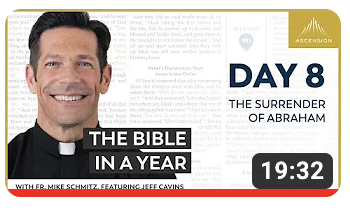Ascension Presents with Fr. Mike Schmitz- YouTube. Day 8, 2024

Genesis 16-17, Job 5-6, and Proverbs 1:20-33
Genesis 16 Abram takes Sarai’s advice and takes their Egyptian maid-servent, Hagar, to have a child by her as Sarai is barren. This inevitably caused jealousy when Hagar became pregnant, and Hagar looked at Sarai contemptuously. Sarai tries to get Abram to deal with it, but he says Sarai has the power to do as she wishes to Hagar. So, Sarai casts Hagar out. So, we see that things do not turn out so well when we take things into our own hands.
An angel of the Lord finds Hagar in the desert and sends her back to Sarai and Abram, telling her that her son will be called Ishmael and promising that Hagar’s descendants will be plentiful as a gift from God because of her affliction. However, the affliction is that Ishmael will be a tyrant of those he rules. Hagar goes back to Abram as she is in awe that she is still alive after seeing the Lord.
Genesis 17 God lays out his covenant with Abram and renames him Abraham, the father of nations. He tells how Sarai will finally bear him a son, Isaac, and all of his descendants will be plentiful and rule over nations. Saria will now be known as Sarah. Do the name changes denote a fundamental change in Sarah and Abraham as they become more closely bound in covenant to God?
The covenant requires that all the men in Abraham’s family and in his care will be circumcised to seal the covenant. This shows that Abraham and Sarai’s tribe handed themselves over more fully to God and his guidance. The surrender of Abraham and yet more bloodletting as a sacrifice, but this time of men’s flesh, not of animals. He tells him that Ishmael will also be a powerful leader but that God is making his covenant with Abraham and his son Isaac. Interestingly, it is once more the second son that takes precedence over the first, as with Abel over Cain and Jacob over Esau.
Job 5-6 Eliphas describes how men with plenty can meet with suffering because of others, even if they have not sinned themselves. He encourages Job to turn to God in his troubles. He shows that there are benefits to learning about suffering so that Job may come closer to God and be blessed. But Job continues to lament that he has not turned from God and has done nothing to deserve his suffering. He is so low that he feels he has nothing left to be able to ask God to help him, even though he has plenty of breath to rue still the day he was born and the suffering he is facing. He feels that all of his friends have forsaken him, even though they have diligently. Job claims he has not been too rash in questioning God’s motives and maintains that he has done nothing to deserve his current afflictions. Yeah, Job could be seen to be wallowing in a depressive state right now and cannot seem to hear the wisdom that his friend is trying to impart. He wants answers from his friends, but not the ones they give him. He preferred things when they were silent and with him in his grief. Perhaps this is how we are with our relationship with God.
Proverbs 1: 20-33 These verses from Proverbs 1 might be an echo of what Eliphas was trying to get through to Job, even though Eliphas does not conjure up reproof to any fools that do not listen to him in the way that Wisdom decries in the lines from Proverbs.
Citations:
The Bible in a Year & More: Fr. Mike & Jeff Cavins. (2021b, June 13). Day 8: The Surrender of Abraham — The Bible in a Year (with Fr. Mike Schmitz) [Video]. YouTube. https://www.youtube.com/watch?v=twgZUO-kyR0
